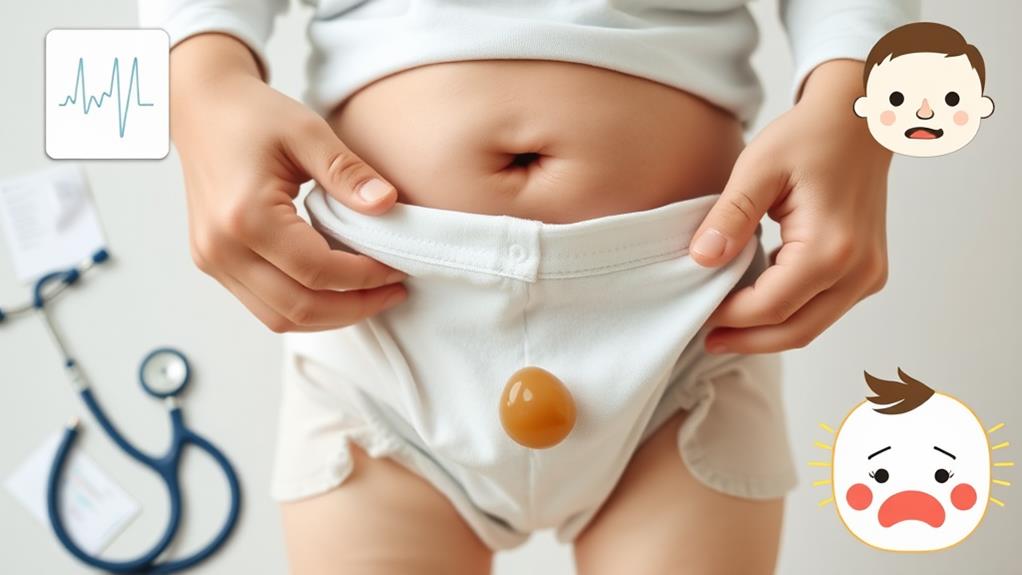If you've noticed mucus in your baby's stool, it's understandable to feel concerned. While small amounts can be normal, there are various factors that could be at play, from teething to dietary changes. It's important to keep an eye on any accompanying symptoms, as they might indicate a need for further attention. You might be wondering how to distinguish between normal and abnormal mucus, and what steps you should take if it persists. Let's explore the insights and tips that can help you navigate this situation effectively.
Causes of Mucus in Stool

Mucus in your baby's stool can arise from several causes, and understanding these can help ease your concerns. One common reason is teething. When your little one is drooling more than usual, they might swallow excess saliva, which can irritate their intestines, leading to mucus in baby poop.
Another culprit could be a viral infection, like gastroenteritis. This often causes intestinal irritation, increasing mucus production and sometimes bringing along diarrhea or fever.
Food allergies are also a possibility, especially to cow's milk or soy protein, affecting around 2-3% of infants. These allergies can cause inflammation in the gastrointestinal tract, resulting in mucus formation.
Additionally, dietary changes, like introducing solid foods or even changes in a breastfeeding mom's diet, can temporarily affect breastfed babies' stools, leading to mucus.
While mucus itself is a natural lubricant that helps with stool passage, keep an eye out for excess mucus or any changes in color. Those could be signs that you might need medical attention.
Symptoms to Watch For
When you notice mucus in your baby's stool, it's important to keep an eye on any accompanying symptoms. Diarrhea, which often shows up as loose and frequent bowel movements, can be a common issue. If your little one seems to be experiencing abdominal pain or cramping, that might indicate gastrointestinal distress, so you'll want to pay extra attention.
Fussy behavior, like excessive crying or irritability, is another sign of discomfort that could relate to mucus in baby stool. And if you see any blood in the stool, don't hesitate—this requires immediate medical attention! It may signal serious health issues that need to be addressed right away.
Also, keep an eye out for symptoms of dehydration. If your baby has a sunken soft spot on their head or a dry mouth, it's time for an urgent medical evaluation.
Normal vs. Abnormal Mucus

Occasionally, you might notice small amounts of mucus in your baby's stool, which can be a normal part of digestion.
Normal mucus in baby stool usually looks slimy or jelly-like and isn't something to worry about. It often happens when your little one is digesting breast milk or formula.
But if you see excessive mucus, it could point to some health issues that you should pay attention to.
You'll want to keep an eye on the color and consistency of the mucus. For example, green or yellow mucus might suggest an infection or allergy, while clear mucus is often less concerning.
It's important to start monitoring stool characteristics closely! If you notice abnormal mucus levels, especially if it's accompanied by signs of distress, increased fussiness, or changes in feeding patterns, it's a good idea to consult your pediatrician.
Diagnosis and Testing Methods
Noticing mucus in your baby's stool can raise concerns, especially if it's more than just a small amount. The first step in diagnosis is a thorough pediatric evaluation. Your doctor will check your baby's medical history and perform a physical examination. This helps them understand what's going on.
Next, stool tests might be needed to look for infections, like bacteria or viruses, which could cause excess mucus.
If you notice other gastrointestinal symptoms, allergy testing could be a good idea. It helps identify any food sensitivities or reactions your baby might have. In some cases, if your baby shows alarming symptoms, an abdominal ultrasound may be necessary to rule out serious issues like intussusception.
While all this sounds a bit daunting, remember that regular monitoring of symptoms and stool characteristics can really help. Keeping track of changes gives your doctor important information to guide appropriate treatment.
Treatment Options Available

Many parents find themselves seeking effective treatment options when they notice mucus in their baby's stool. The first step is to identify the underlying cause. If it's linked to a food allergy, dietary adjustments might be necessary. Keeping an eye on what your little one eats can make a big difference!
Hydration is super important, especially if there's diarrhea. You want to keep your baby hydrated to prevent dehydration, which isn't fun for anyone. You might also consider introducing probiotics to help restore gut health, especially after a viral infection or antibiotic use.
If you think the mucus is related to teething, try using teething toys and maintaining good oral hygiene. This can ease discomfort and might even help reduce mucus production.
If the mucus persists or if you notice concerning symptoms, don't hesitate to consult a pediatrician. They can suggest specific treatment options or dietary changes tailored to your baby's needs.
Mucus in Newborn Stool
When it comes to a newborn's stool, mucus can often be a normal part of their digestive process. In those first few days, your little one will pass meconium, which is that thick, black substance made up of amniotic fluid, skin cells, and mucus.
As they start feeding more, their stool usually changes from dark green to a cheerful yellow or yellow-green. This is a good sign that their digestive system is working well!
Now, if your baby's breastfed, you might notice they've looser stools and could poop as much as 6-10 times a day. On the other hand, formula-fed babies may have firmer stools, with bowel movements happening anywhere from several times a day to a few days apart.
Mucus in their stool is generally nothing to worry about and is often just a part of the process.
However, keep an eye out for any significant changes in consistency or color, as those could be signs of a potential health issue. If you're ever concerned, a quick chat with your pediatrician can help clear things up—no need for a medical degree to keep your baby healthy!
Health Risks Associated

While mucus in your baby's stool is often harmless, persistent mucus lasting more than two days can be a cause for concern.
If you notice mucus in baby poop along with other symptoms, it could indicate underlying health issues. For instance, if your little one has a fever, is vomiting, or shows signs of dehydration, these may be signs of serious conditions that need immediate attention.
Now, here's where it gets serious: if you spot blood in the stool, that's a big red flag. You should seek urgent medical assessment right away to rule out any severe gastrointestinal problems.
Although it's rare, mucus can also signal intussusception, a medical emergency where parts of the intestinal tract slide into each other. Yikes!
When to Seek Help
Noticing mucus in your baby's stool can be alarming, especially if it persists beyond a couple of days. If you see mucus hanging around for more than two days, it's time to seek medical advice. This could mean there's an underlying health issue that needs attention.
Keep an eye out for other symptoms too. If your baby has vomiting, diarrhea, or a fever alongside the mucus, don't hesitate to call your pediatrician.
Dehydration is another red flag. If your baby shows signs like a dry mouth, lack of tears when crying, or sunken soft spots on their head, get medical help quickly.
You should also take note of any unusual stool appearance. If you spot dark red, jelly-like consistency or black stools, that's a signal for urgent evaluation.
Persistent mucus, especially if your baby's behavior or feeding patterns change, should definitely be checked out. Early intervention can make a big difference.
Dietary Considerations

Dietary considerations play a crucial role in managing mucus in your baby's stool. If your little one shows signs of mucus, it's important to take a closer look at what they're eating.
For breastfeeding mothers, certain foods like dairy or soy might be the culprits behind food sensitivities, leading to mucus in their stool. If you've recently introduced solid foods, be mindful of allergens that could be causing changes as well.
Formula-fed babies can also experience mucus after switching formulas, especially if the new formula has different protein sources or allergens. It might feel like a guessing game, but keeping a food diary can help you spot dietary triggers easily.
Jot down everything your baby eats and any changes in their stool; it's like a detective story but with less drama!
You might also want to consider probiotics, which can support your baby's gut health and help balance their microbiome.
Understanding Baby Stool Changes
Mucus in your baby's stool can be concerning, but it's often a normal part of their digestive process. For infants, mucus acts as a lubricant, helping stool pass smoothly through the intestines. You might notice small amounts of mucus, especially during teething or when your little one starts munching on solid foods. It's all part of their growing digestive system!
When your baby is born, they produce meconium, which is a sticky substance that contains mucus. As they start eating, their stool changes color and consistency, usually becoming yellow or green.
However, if you see excessive mucus or notice changes in stool color, it could signal allergies or infections, which may require a chat with your healthcare provider.
Keeping an eye on your baby's bowel movements is essential. Are they frequent? Any fussiness or signs of dehydration? These factors can help you assess your baby's digestive health.




